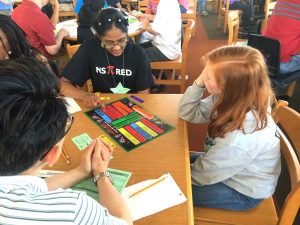 Students who have been proficient at the games may wish to test their problem-solving abilities with students from other schools at a National Mathematics Pentathlon® Academic Tournament. Teachers and parents can help these students by preparing them for this level of involvement. If students intend to participate in a National Tournament, they need to be knowledgeable of the procedures and rules that apply to such competition.
Students who have been proficient at the games may wish to test their problem-solving abilities with students from other schools at a National Mathematics Pentathlon® Academic Tournament. Teachers and parents can help these students by preparing them for this level of involvement. If students intend to participate in a National Tournament, they need to be knowledgeable of the procedures and rules that apply to such competition.
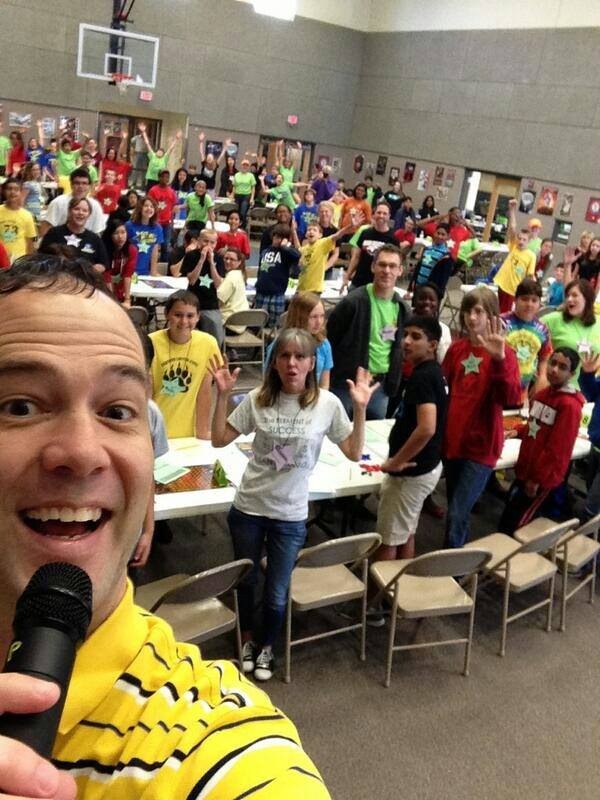 Teachers, coaches, and parents prepare students for tournaments by refining their game strategies and orienting them to the procedural and challenge rules within each game. While learning the games we suggest organizing students into cooperative groups of 4. However, when preparing students for a tournament, we recommend that they play the games one-on-one. Students must formally register and make arrangements to attend one of the National Mathematics Pentathlon® Academic Tournaments. For each of the 5 games at a National Tournament, each participant is matched with a different student at the same grade level from different schools.
Teachers, coaches, and parents prepare students for tournaments by refining their game strategies and orienting them to the procedural and challenge rules within each game. While learning the games we suggest organizing students into cooperative groups of 4. However, when preparing students for a tournament, we recommend that they play the games one-on-one. Students must formally register and make arrangements to attend one of the National Mathematics Pentathlon® Academic Tournaments. For each of the 5 games at a National Tournament, each participant is matched with a different student at the same grade level from different schools.
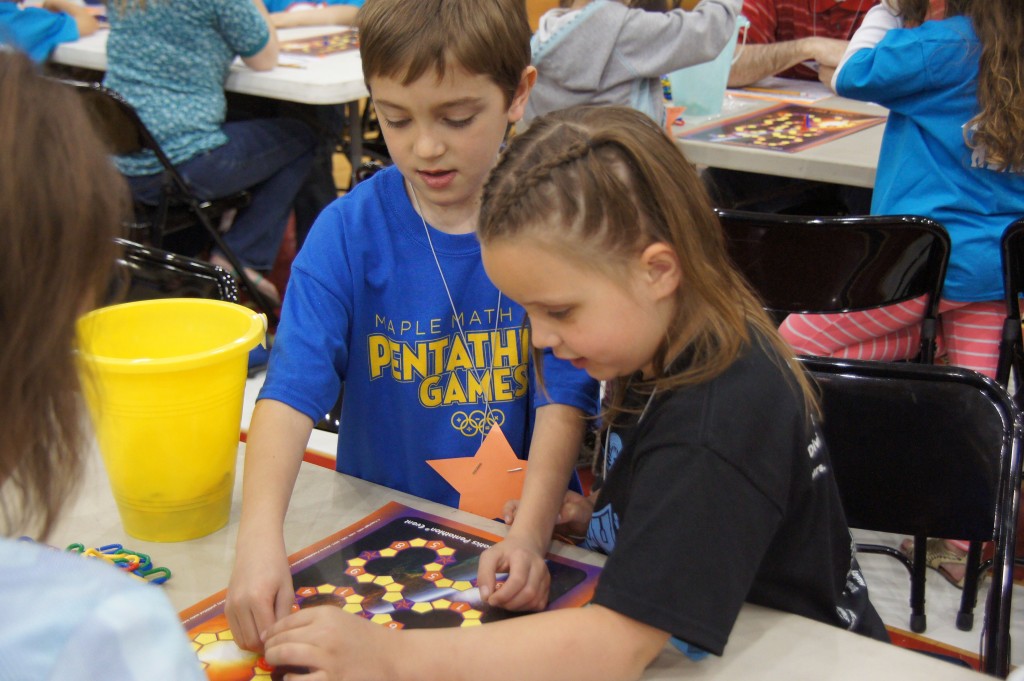 Adult volunteers serve as Game Monitors at each of the National Tournaments that are hosted by school districts, systems, or a university. Each two-person game is officiated by one adult Game Monitor. Fall Training Sessions are conducted in areas where National Academic Tournaments are held to help parents, teachers, and administrators learn the games. In addition, Spring Game Monitor Training Sessions are conducted by Pentathlon Representatives to assist prospective Game Monitors in the details of Tournament procedures. The Pentathlon Institute’s trademarks, copyrights, and servicemarks ensure that each National Tournament provides the same standards of competition experienced in all other Mathematics Pentathlon® Tournaments.
Adult volunteers serve as Game Monitors at each of the National Tournaments that are hosted by school districts, systems, or a university. Each two-person game is officiated by one adult Game Monitor. Fall Training Sessions are conducted in areas where National Academic Tournaments are held to help parents, teachers, and administrators learn the games. In addition, Spring Game Monitor Training Sessions are conducted by Pentathlon Representatives to assist prospective Game Monitors in the details of Tournament procedures. The Pentathlon Institute’s trademarks, copyrights, and servicemarks ensure that each National Tournament provides the same standards of competition experienced in all other Mathematics Pentathlon® Tournaments.
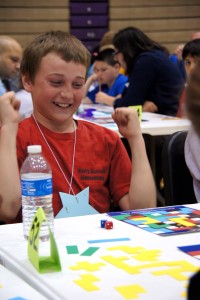 Most other competitions are designed with local, state, regional, and national run-offs to determine “the best” student within a particular category. Such competitions rarely attract students from a broad-ability range. The Mathematics Pentathlon® Program does not utilize a run-off-based system of competition. All prepared students are welcome to register for any National Mathematics Pentathlon® Academic Tournament. Awards at a National Tournament are based on a point system rather than a run-off. Each participant is awarded 3 points for a win, 2 points for a tie, and 1 point for a loss. All individual participants, referred to as PentathletesTM receive formal recognition and applause for their efforts at an Awards Ceremony. In addition to individual awards, a school may send an Official National Team. Such a Team consists of 30 students across 5 grade levels, with 3 girls & 3 boys at each grade level. 1st, 2nd, and 3rd Place Team Trophies are awarded to these Teams.
Most other competitions are designed with local, state, regional, and national run-offs to determine “the best” student within a particular category. Such competitions rarely attract students from a broad-ability range. The Mathematics Pentathlon® Program does not utilize a run-off-based system of competition. All prepared students are welcome to register for any National Mathematics Pentathlon® Academic Tournament. Awards at a National Tournament are based on a point system rather than a run-off. Each participant is awarded 3 points for a win, 2 points for a tie, and 1 point for a loss. All individual participants, referred to as PentathletesTM receive formal recognition and applause for their efforts at an Awards Ceremony. In addition to individual awards, a school may send an Official National Team. Such a Team consists of 30 students across 5 grade levels, with 3 girls & 3 boys at each grade level. 1st, 2nd, and 3rd Place Team Trophies are awarded to these Teams.
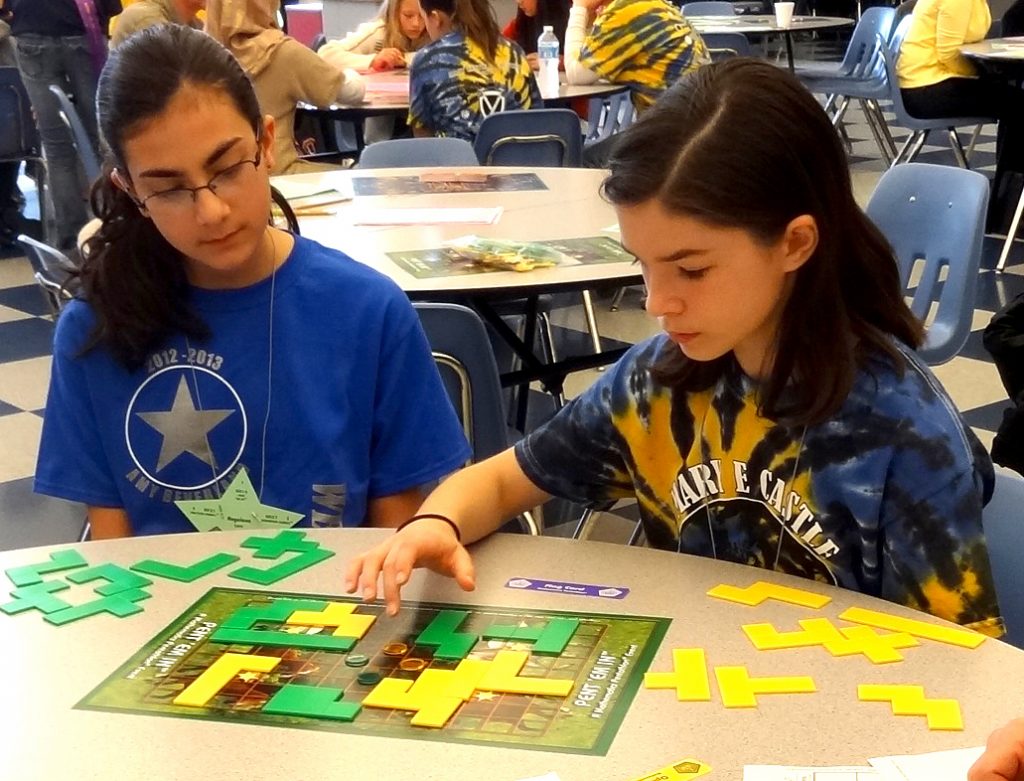 National and International studies continue to report that most students lack an understanding of mathematics on a higher problem-solving level. This level involves the use of critical thinking skills, logical and hypothetical reasoning, articulating patterns, and discerning relationships among mathematical topics and ideas. Yet paper and pencil assessments are often ineffective at evaluating these important thought processes. In order to maintain test reliability, most standardized test items only assess lower cognitive abilities such as knowledge and comprehension of specific information. A more dynamic index is needed to assess students’ strategic thinking skills. Evidence suggests that the National Mathematics Pentathlon® Academic Tournaments provide such a necessary index. District representatives may wish to examine the active problem-solving performance of their individual students or teams that compete in a National Tournament. Such analysis will provide new insight into the challenges that exist in reconstructing the assessment of higher-order thinking.
National and International studies continue to report that most students lack an understanding of mathematics on a higher problem-solving level. This level involves the use of critical thinking skills, logical and hypothetical reasoning, articulating patterns, and discerning relationships among mathematical topics and ideas. Yet paper and pencil assessments are often ineffective at evaluating these important thought processes. In order to maintain test reliability, most standardized test items only assess lower cognitive abilities such as knowledge and comprehension of specific information. A more dynamic index is needed to assess students’ strategic thinking skills. Evidence suggests that the National Mathematics Pentathlon® Academic Tournaments provide such a necessary index. District representatives may wish to examine the active problem-solving performance of their individual students or teams that compete in a National Tournament. Such analysis will provide new insight into the challenges that exist in reconstructing the assessment of higher-order thinking.